Analyzing Civil Disobedience in Antigone and Martin Luther King Jr.
VerifiedAdded on 2020/04/21
|6
|1414
|101
Essay
AI Summary
The essay delves into the concept of civil disobedience as demonstrated by Antigone from Sophocles' play and Martin Luther King Jr., a pivotal figure in the American Civil Rights Movement. Despite existing in vastly different eras and cultural settings, both figures exemplify resistance against unjust laws based on moral grounds. Antigone's defiance is driven by familial duty and divine law, challenging Creon’s edict to honor her brother Polynices with burial rites. Conversely, Martin Luther King Jr.'s approach was rooted in the fight for racial equality and justice through nonviolent protest, aiming to dismantle systemic racism across America. The essay compares their methods of protest, personal sacrifices, and the broader social implications of their actions. It concludes by reflecting on the enduring relevance of civil disobedience as a powerful tool against tyranny, highlighting its adaptability to various socio-political contexts while underscoring the distinct outcomes each figure achieved in their respective struggles.
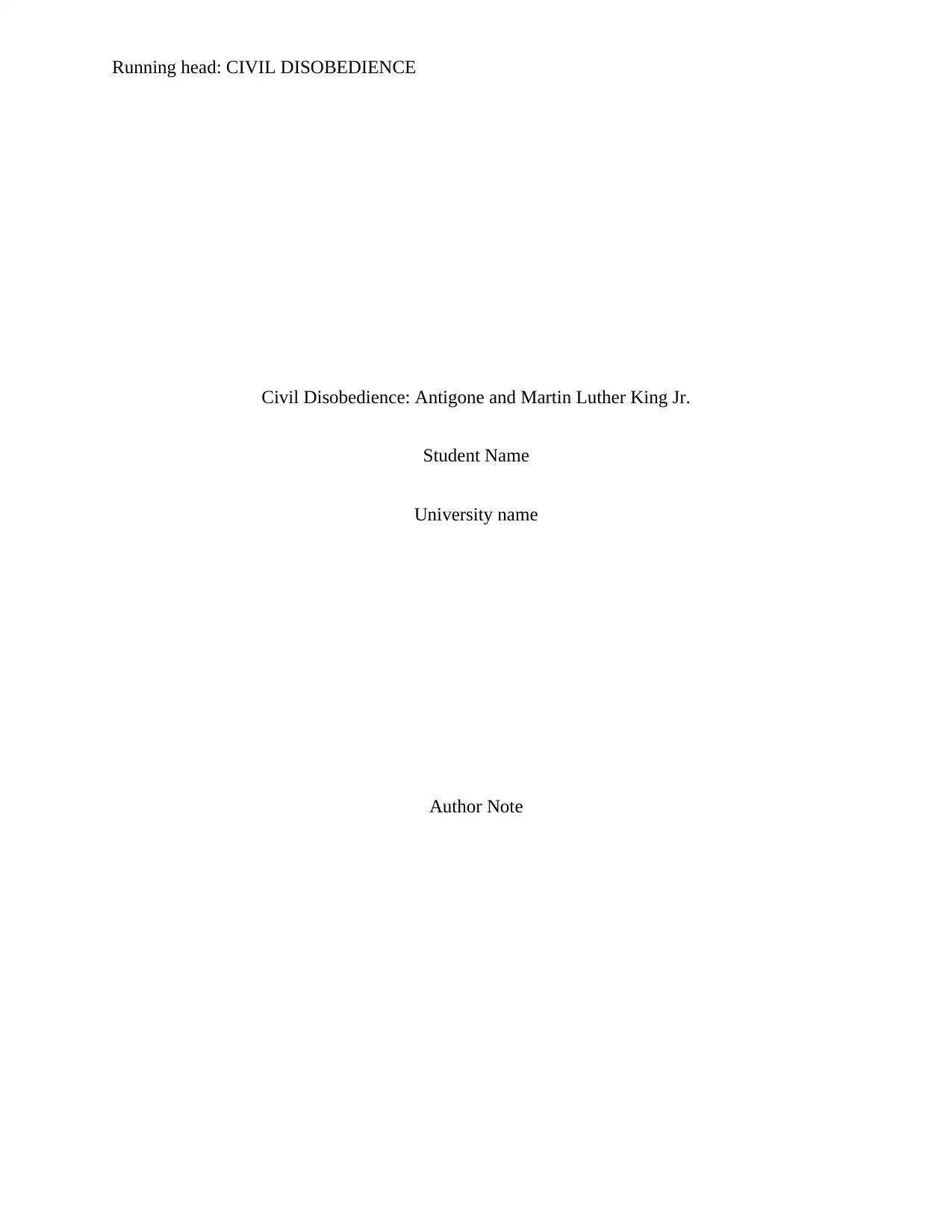
Running head: CIVIL DISOBEDIENCE
Civil Disobedience: Antigone and Martin Luther King Jr.
Student Name
University name
Author Note
Civil Disobedience: Antigone and Martin Luther King Jr.
Student Name
University name
Author Note
Paraphrase This Document
Need a fresh take? Get an instant paraphrase of this document with our AI Paraphraser
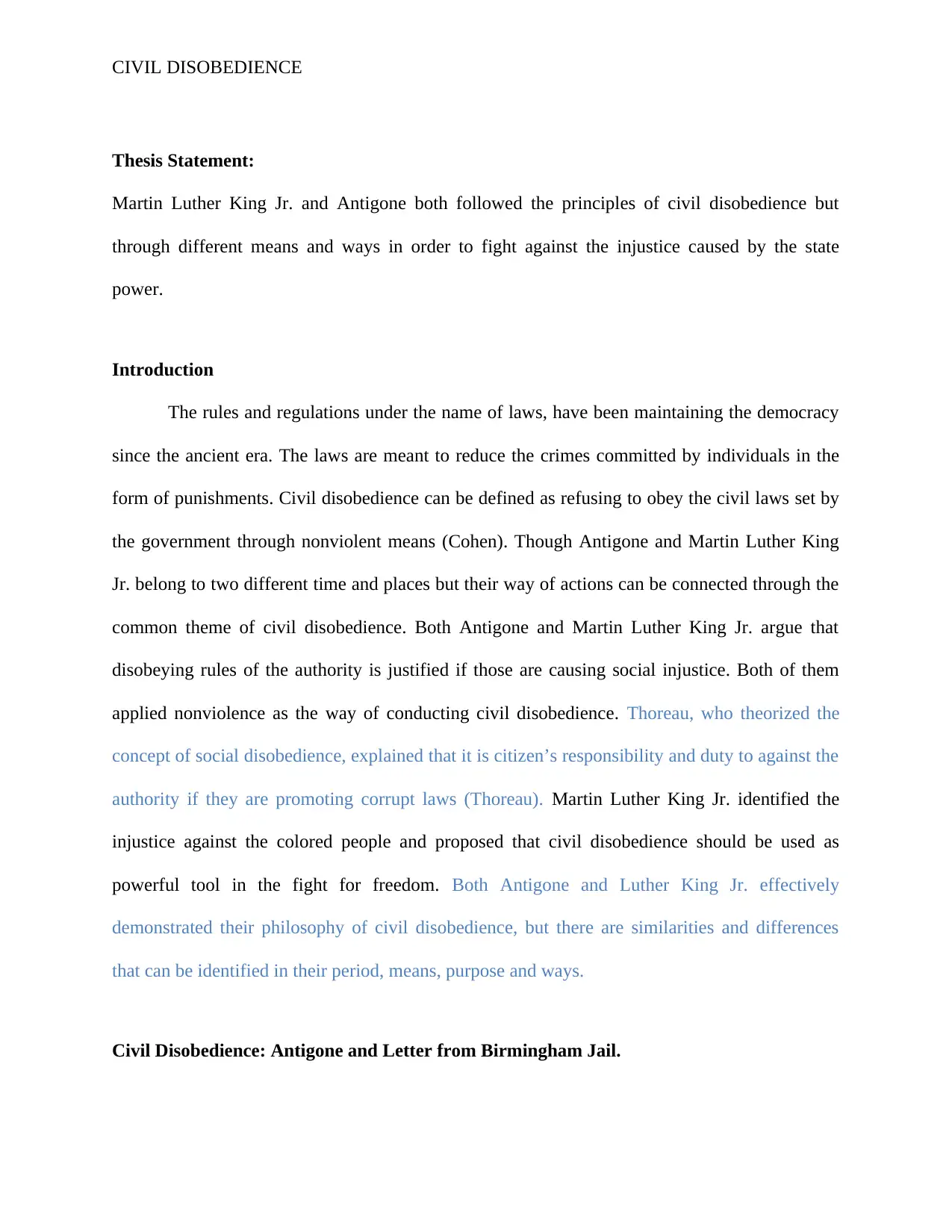
CIVIL DISOBEDIENCE
Thesis Statement:
Martin Luther King Jr. and Antigone both followed the principles of civil disobedience but
through different means and ways in order to fight against the injustice caused by the state
power.
Introduction
The rules and regulations under the name of laws, have been maintaining the democracy
since the ancient era. The laws are meant to reduce the crimes committed by individuals in the
form of punishments. Civil disobedience can be defined as refusing to obey the civil laws set by
the government through nonviolent means (Cohen). Though Antigone and Martin Luther King
Jr. belong to two different time and places but their way of actions can be connected through the
common theme of civil disobedience. Both Antigone and Martin Luther King Jr. argue that
disobeying rules of the authority is justified if those are causing social injustice. Both of them
applied nonviolence as the way of conducting civil disobedience. Thoreau, who theorized the
concept of social disobedience, explained that it is citizen’s responsibility and duty to against the
authority if they are promoting corrupt laws (Thoreau). Martin Luther King Jr. identified the
injustice against the colored people and proposed that civil disobedience should be used as
powerful tool in the fight for freedom. Both Antigone and Luther King Jr. effectively
demonstrated their philosophy of civil disobedience, but there are similarities and differences
that can be identified in their period, means, purpose and ways.
Civil Disobedience: Antigone and Letter from Birmingham Jail.
Thesis Statement:
Martin Luther King Jr. and Antigone both followed the principles of civil disobedience but
through different means and ways in order to fight against the injustice caused by the state
power.
Introduction
The rules and regulations under the name of laws, have been maintaining the democracy
since the ancient era. The laws are meant to reduce the crimes committed by individuals in the
form of punishments. Civil disobedience can be defined as refusing to obey the civil laws set by
the government through nonviolent means (Cohen). Though Antigone and Martin Luther King
Jr. belong to two different time and places but their way of actions can be connected through the
common theme of civil disobedience. Both Antigone and Martin Luther King Jr. argue that
disobeying rules of the authority is justified if those are causing social injustice. Both of them
applied nonviolence as the way of conducting civil disobedience. Thoreau, who theorized the
concept of social disobedience, explained that it is citizen’s responsibility and duty to against the
authority if they are promoting corrupt laws (Thoreau). Martin Luther King Jr. identified the
injustice against the colored people and proposed that civil disobedience should be used as
powerful tool in the fight for freedom. Both Antigone and Luther King Jr. effectively
demonstrated their philosophy of civil disobedience, but there are similarities and differences
that can be identified in their period, means, purpose and ways.
Civil Disobedience: Antigone and Letter from Birmingham Jail.
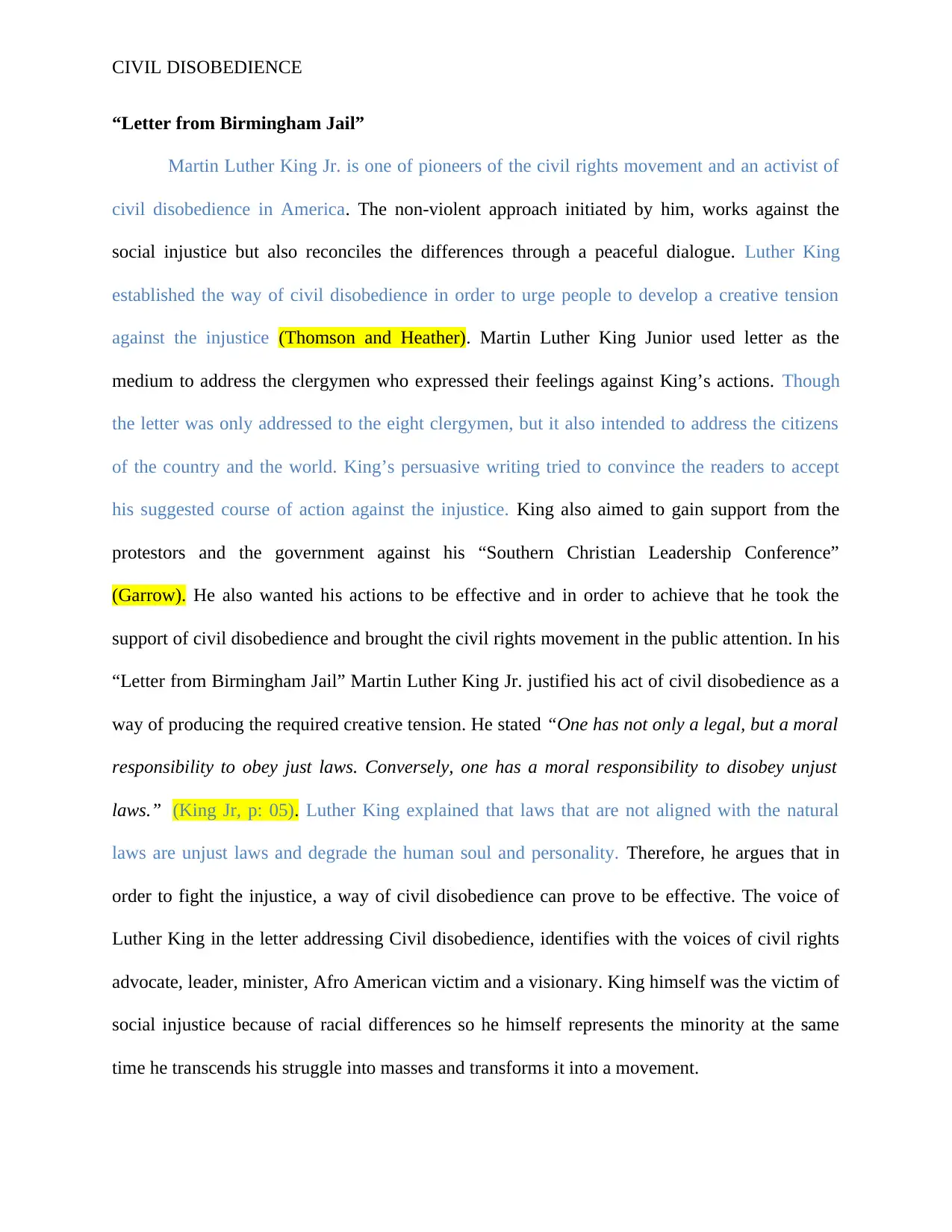
CIVIL DISOBEDIENCE
“Letter from Birmingham Jail”
Martin Luther King Jr. is one of pioneers of the civil rights movement and an activist of
civil disobedience in America. The non-violent approach initiated by him, works against the
social injustice but also reconciles the differences through a peaceful dialogue. Luther King
established the way of civil disobedience in order to urge people to develop a creative tension
against the injustice (Thomson and Heather). Martin Luther King Junior used letter as the
medium to address the clergymen who expressed their feelings against King’s actions. Though
the letter was only addressed to the eight clergymen, but it also intended to address the citizens
of the country and the world. King’s persuasive writing tried to convince the readers to accept
his suggested course of action against the injustice. King also aimed to gain support from the
protestors and the government against his “Southern Christian Leadership Conference”
(Garrow). He also wanted his actions to be effective and in order to achieve that he took the
support of civil disobedience and brought the civil rights movement in the public attention. In his
“Letter from Birmingham Jail” Martin Luther King Jr. justified his act of civil disobedience as a
way of producing the required creative tension. He stated “One has not only a legal, but a moral
responsibility to obey just laws. Conversely, one has a moral responsibility to disobey unjust
laws.” (King Jr, p: 05). Luther King explained that laws that are not aligned with the natural
laws are unjust laws and degrade the human soul and personality. Therefore, he argues that in
order to fight the injustice, a way of civil disobedience can prove to be effective. The voice of
Luther King in the letter addressing Civil disobedience, identifies with the voices of civil rights
advocate, leader, minister, Afro American victim and a visionary. King himself was the victim of
social injustice because of racial differences so he himself represents the minority at the same
time he transcends his struggle into masses and transforms it into a movement.
“Letter from Birmingham Jail”
Martin Luther King Jr. is one of pioneers of the civil rights movement and an activist of
civil disobedience in America. The non-violent approach initiated by him, works against the
social injustice but also reconciles the differences through a peaceful dialogue. Luther King
established the way of civil disobedience in order to urge people to develop a creative tension
against the injustice (Thomson and Heather). Martin Luther King Junior used letter as the
medium to address the clergymen who expressed their feelings against King’s actions. Though
the letter was only addressed to the eight clergymen, but it also intended to address the citizens
of the country and the world. King’s persuasive writing tried to convince the readers to accept
his suggested course of action against the injustice. King also aimed to gain support from the
protestors and the government against his “Southern Christian Leadership Conference”
(Garrow). He also wanted his actions to be effective and in order to achieve that he took the
support of civil disobedience and brought the civil rights movement in the public attention. In his
“Letter from Birmingham Jail” Martin Luther King Jr. justified his act of civil disobedience as a
way of producing the required creative tension. He stated “One has not only a legal, but a moral
responsibility to obey just laws. Conversely, one has a moral responsibility to disobey unjust
laws.” (King Jr, p: 05). Luther King explained that laws that are not aligned with the natural
laws are unjust laws and degrade the human soul and personality. Therefore, he argues that in
order to fight the injustice, a way of civil disobedience can prove to be effective. The voice of
Luther King in the letter addressing Civil disobedience, identifies with the voices of civil rights
advocate, leader, minister, Afro American victim and a visionary. King himself was the victim of
social injustice because of racial differences so he himself represents the minority at the same
time he transcends his struggle into masses and transforms it into a movement.
⊘ This is a preview!⊘
Do you want full access?
Subscribe today to unlock all pages.

Trusted by 1+ million students worldwide
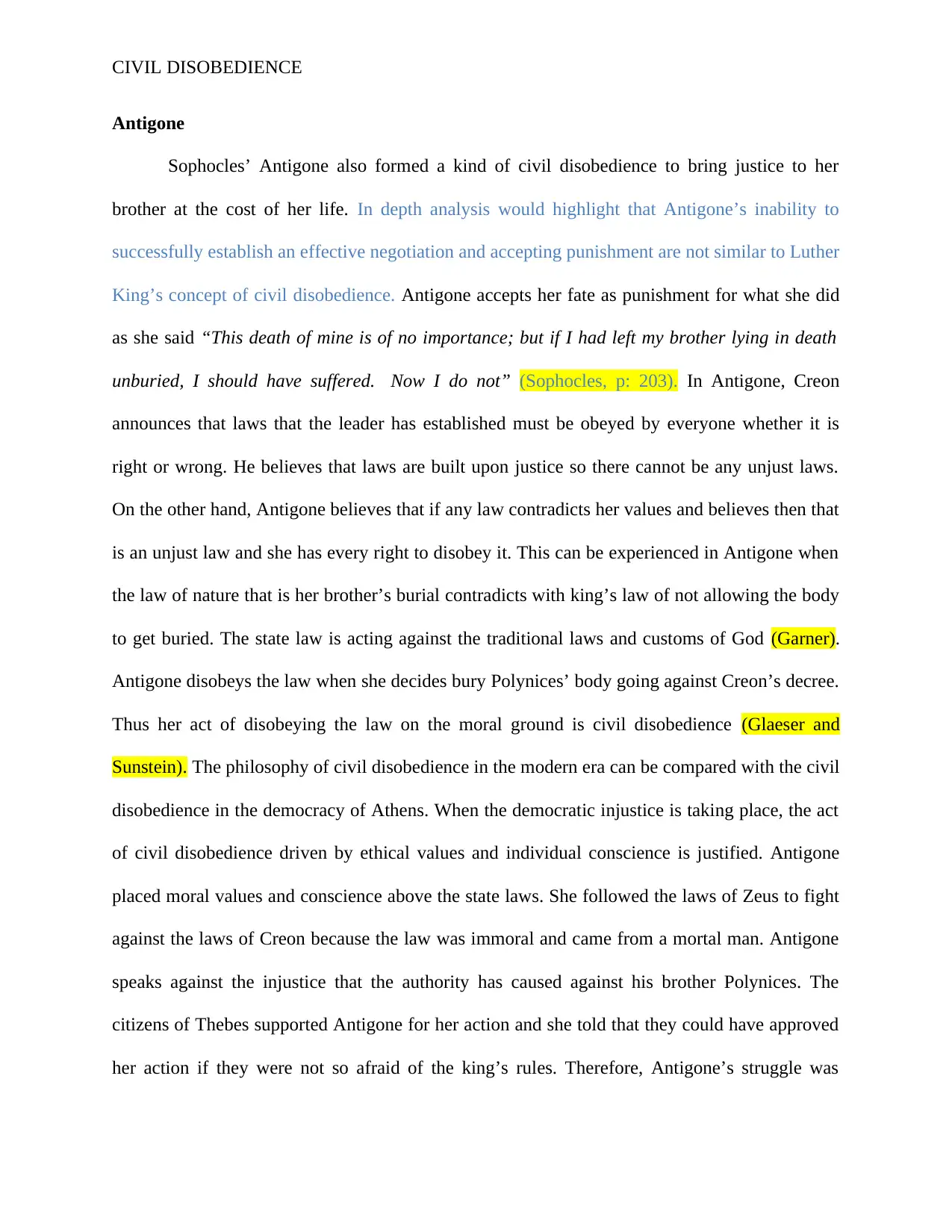
CIVIL DISOBEDIENCE
Antigone
Sophocles’ Antigone also formed a kind of civil disobedience to bring justice to her
brother at the cost of her life. In depth analysis would highlight that Antigone’s inability to
successfully establish an effective negotiation and accepting punishment are not similar to Luther
King’s concept of civil disobedience. Antigone accepts her fate as punishment for what she did
as she said “This death of mine is of no importance; but if I had left my brother lying in death
unburied, I should have suffered. Now I do not” (Sophocles, p: 203). In Antigone, Creon
announces that laws that the leader has established must be obeyed by everyone whether it is
right or wrong. He believes that laws are built upon justice so there cannot be any unjust laws.
On the other hand, Antigone believes that if any law contradicts her values and believes then that
is an unjust law and she has every right to disobey it. This can be experienced in Antigone when
the law of nature that is her brother’s burial contradicts with king’s law of not allowing the body
to get buried. The state law is acting against the traditional laws and customs of God (Garner).
Antigone disobeys the law when she decides bury Polynices’ body going against Creon’s decree.
Thus her act of disobeying the law on the moral ground is civil disobedience (Glaeser and
Sunstein). The philosophy of civil disobedience in the modern era can be compared with the civil
disobedience in the democracy of Athens. When the democratic injustice is taking place, the act
of civil disobedience driven by ethical values and individual conscience is justified. Antigone
placed moral values and conscience above the state laws. She followed the laws of Zeus to fight
against the laws of Creon because the law was immoral and came from a mortal man. Antigone
speaks against the injustice that the authority has caused against his brother Polynices. The
citizens of Thebes supported Antigone for her action and she told that they could have approved
her action if they were not so afraid of the king’s rules. Therefore, Antigone’s struggle was
Antigone
Sophocles’ Antigone also formed a kind of civil disobedience to bring justice to her
brother at the cost of her life. In depth analysis would highlight that Antigone’s inability to
successfully establish an effective negotiation and accepting punishment are not similar to Luther
King’s concept of civil disobedience. Antigone accepts her fate as punishment for what she did
as she said “This death of mine is of no importance; but if I had left my brother lying in death
unburied, I should have suffered. Now I do not” (Sophocles, p: 203). In Antigone, Creon
announces that laws that the leader has established must be obeyed by everyone whether it is
right or wrong. He believes that laws are built upon justice so there cannot be any unjust laws.
On the other hand, Antigone believes that if any law contradicts her values and believes then that
is an unjust law and she has every right to disobey it. This can be experienced in Antigone when
the law of nature that is her brother’s burial contradicts with king’s law of not allowing the body
to get buried. The state law is acting against the traditional laws and customs of God (Garner).
Antigone disobeys the law when she decides bury Polynices’ body going against Creon’s decree.
Thus her act of disobeying the law on the moral ground is civil disobedience (Glaeser and
Sunstein). The philosophy of civil disobedience in the modern era can be compared with the civil
disobedience in the democracy of Athens. When the democratic injustice is taking place, the act
of civil disobedience driven by ethical values and individual conscience is justified. Antigone
placed moral values and conscience above the state laws. She followed the laws of Zeus to fight
against the laws of Creon because the law was immoral and came from a mortal man. Antigone
speaks against the injustice that the authority has caused against his brother Polynices. The
citizens of Thebes supported Antigone for her action and she told that they could have approved
her action if they were not so afraid of the king’s rules. Therefore, Antigone’s struggle was
Paraphrase This Document
Need a fresh take? Get an instant paraphrase of this document with our AI Paraphraser
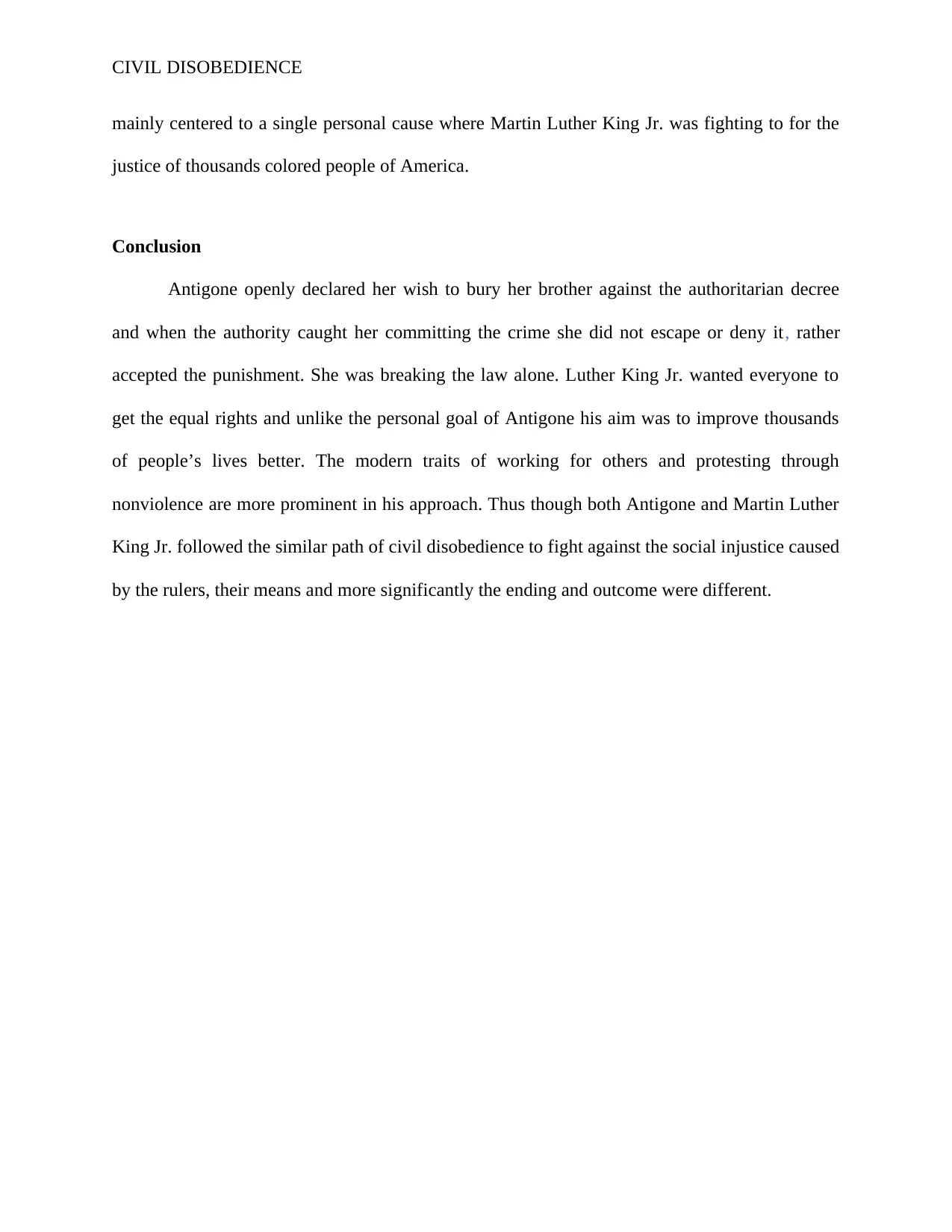
CIVIL DISOBEDIENCE
mainly centered to a single personal cause where Martin Luther King Jr. was fighting to for the
justice of thousands colored people of America.
Conclusion
Antigone openly declared her wish to bury her brother against the authoritarian decree
and when the authority caught her committing the crime she did not escape or deny it, rather
accepted the punishment. She was breaking the law alone. Luther King Jr. wanted everyone to
get the equal rights and unlike the personal goal of Antigone his aim was to improve thousands
of people’s lives better. The modern traits of working for others and protesting through
nonviolence are more prominent in his approach. Thus though both Antigone and Martin Luther
King Jr. followed the similar path of civil disobedience to fight against the social injustice caused
by the rulers, their means and more significantly the ending and outcome were different.
mainly centered to a single personal cause where Martin Luther King Jr. was fighting to for the
justice of thousands colored people of America.
Conclusion
Antigone openly declared her wish to bury her brother against the authoritarian decree
and when the authority caught her committing the crime she did not escape or deny it, rather
accepted the punishment. She was breaking the law alone. Luther King Jr. wanted everyone to
get the equal rights and unlike the personal goal of Antigone his aim was to improve thousands
of people’s lives better. The modern traits of working for others and protesting through
nonviolence are more prominent in his approach. Thus though both Antigone and Martin Luther
King Jr. followed the similar path of civil disobedience to fight against the social injustice caused
by the rulers, their means and more significantly the ending and outcome were different.
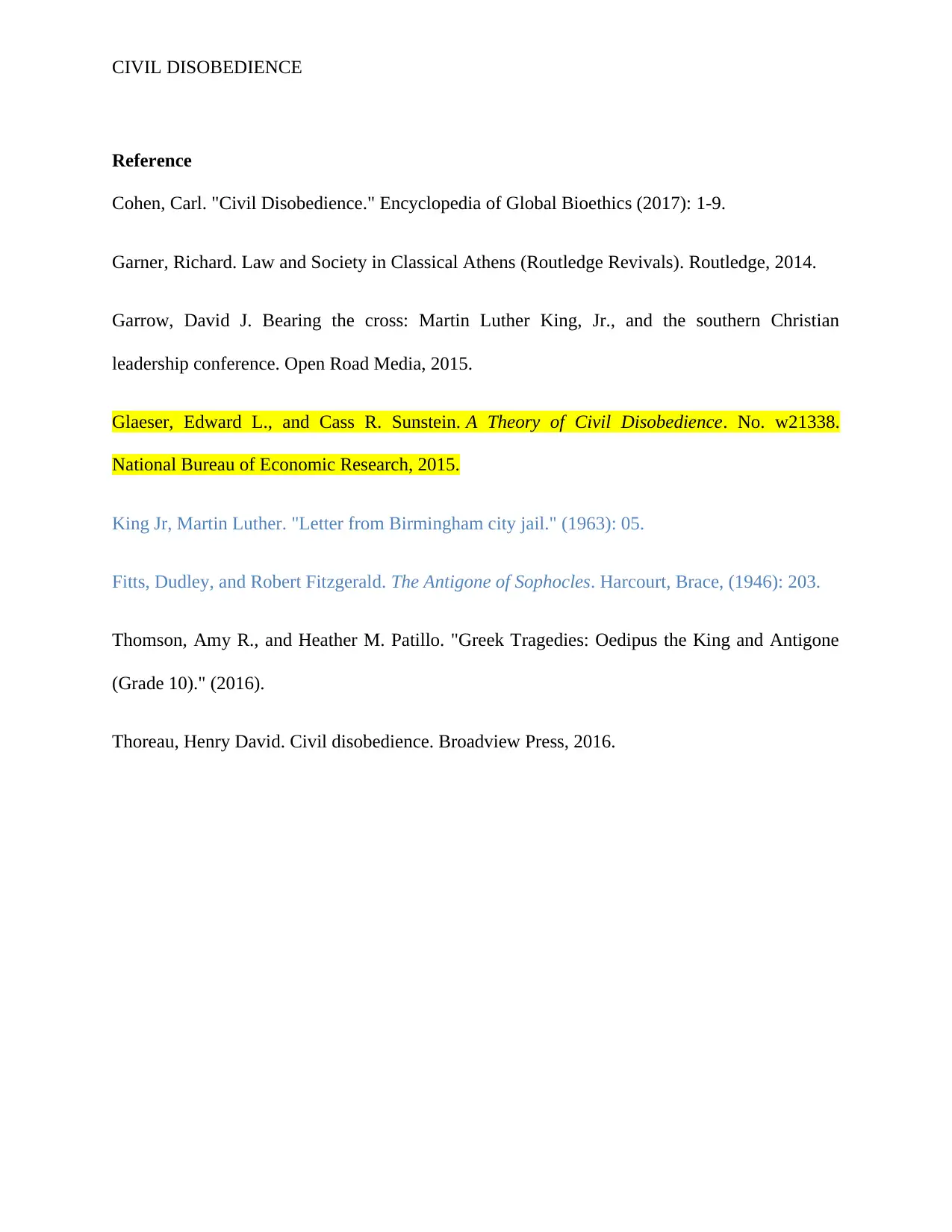
CIVIL DISOBEDIENCE
Reference
Cohen, Carl. "Civil Disobedience." Encyclopedia of Global Bioethics (2017): 1-9.
Garner, Richard. Law and Society in Classical Athens (Routledge Revivals). Routledge, 2014.
Garrow, David J. Bearing the cross: Martin Luther King, Jr., and the southern Christian
leadership conference. Open Road Media, 2015.
Glaeser, Edward L., and Cass R. Sunstein. A Theory of Civil Disobedience. No. w21338.
National Bureau of Economic Research, 2015.
King Jr, Martin Luther. "Letter from Birmingham city jail." (1963): 05.
Fitts, Dudley, and Robert Fitzgerald. The Antigone of Sophocles. Harcourt, Brace, (1946): 203.
Thomson, Amy R., and Heather M. Patillo. "Greek Tragedies: Oedipus the King and Antigone
(Grade 10)." (2016).
Thoreau, Henry David. Civil disobedience. Broadview Press, 2016.
Reference
Cohen, Carl. "Civil Disobedience." Encyclopedia of Global Bioethics (2017): 1-9.
Garner, Richard. Law and Society in Classical Athens (Routledge Revivals). Routledge, 2014.
Garrow, David J. Bearing the cross: Martin Luther King, Jr., and the southern Christian
leadership conference. Open Road Media, 2015.
Glaeser, Edward L., and Cass R. Sunstein. A Theory of Civil Disobedience. No. w21338.
National Bureau of Economic Research, 2015.
King Jr, Martin Luther. "Letter from Birmingham city jail." (1963): 05.
Fitts, Dudley, and Robert Fitzgerald. The Antigone of Sophocles. Harcourt, Brace, (1946): 203.
Thomson, Amy R., and Heather M. Patillo. "Greek Tragedies: Oedipus the King and Antigone
(Grade 10)." (2016).
Thoreau, Henry David. Civil disobedience. Broadview Press, 2016.
⊘ This is a preview!⊘
Do you want full access?
Subscribe today to unlock all pages.

Trusted by 1+ million students worldwide
1 out of 6
Related Documents
Your All-in-One AI-Powered Toolkit for Academic Success.
+13062052269
info@desklib.com
Available 24*7 on WhatsApp / Email
![[object Object]](/_next/static/media/star-bottom.7253800d.svg)
Unlock your academic potential
Copyright © 2020–2025 A2Z Services. All Rights Reserved. Developed and managed by ZUCOL.





